I’m totally going to jinx this, but I can’t get over the glaring lack of socio-political outrage on Facebook lately.
I thought it was just me – until I remarked about it on Facebook and several of my friends confirmed my observation (and joy). Maybe it’s only happening to a few of us, which could mean the algorithms are working as they should, at last. Maybe the Russians are too distracted with their own mess to be meddling as much in ours.
Or maybe, just maybe, the majority is finally getting sick of it.
I say majority because you can still find plenty of discord on the hell-hole Twitter has become. And a handful of my asshole (he says lovingly) friends on Facebook will still post the occasional incendiary meme, which I only notice since they’ve become so rare.
It doesn’t mean people have lost their conviction. The owner of the beer store in the scarlet red town near our cabin told me his Bud Light sales are off 85%, with no sign of rebounding. The protesting is just more silent.
In recent eras gone by, the bevy of controversial Supreme Court rulings before the July 4th weekend would’ve been a powder keg of Facebook politicking. Remember way back in 2015 when SCOTUS ruled on same-sex marriage – the site was plastered with rainbow-tinted profile pictures. Or, during that same summer, when the Confederate Flag was removed from the South Carolina capitol building. I don’t recall any flag-tinted profile pics on the right, but there was plenty of boastful celebration on the left.
Republicans didn’t become as outspoken as Dems on Facebook until late 2016 and it’s been roughly equal ever since. True story.
The precipitous decay of cable news viewership is clearly correlated with the decline in social network infighting. The question is whether it’s a cause, an effect, or merely parallel. Ad-supported tribal fear-mongering no doubt bleeds into social media, but conflict fatigue could also lead people to turn off the talking heads.
I’ll stick to my year-long, data-supported theory that these trends are byproducts of our collective, post-COVID longing for comfort and well-being. Whether we’re consciously avoiding socio-political debate or distracting ourselves by traveling, camping, playing pickleball, or watching the second season of The Bear, which might be the finest masterpiece on television in years – I digress – our political hypnosis seems to have broken…for now.
Let’s keep it up.
Here’s what we’re seeing:
Consumer confidence dropped ever-so-slightly this week. The move is barely worthy of a headline, as our Economic Sentiment Index fell a measly .3 points, driven entirely by weaker feelings about major purchases and the job market. Confidence in the overall U.S. economy, housing market, and personal finances all improved, but not quite enough to offset the negative indicators. All-in-all, it’s a non-event.
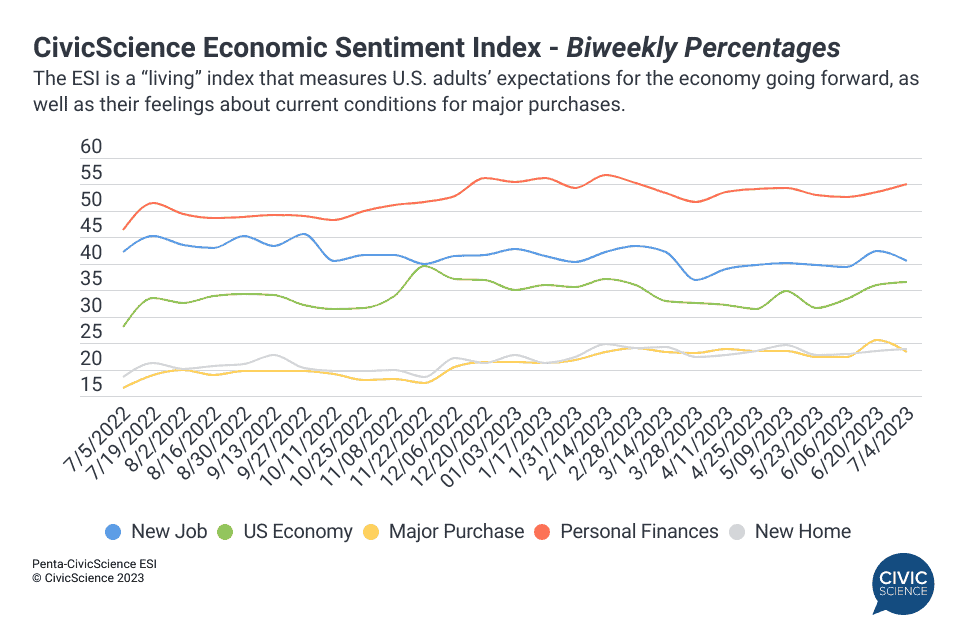
We’ll get a different view of the real consumer economy next week as Amazon Prime Day(s) roll around. American productivity will take a hit next Tuesday and Wednesday as millions of workers – particularly remote and hybrid ones – go deal-hunting while pretending to pay attention in Zoom meetings. The percentage of U.S. adults who plan to participate in the event is up 12 points over last year – including nearly half of all Prime members. The numbers are particularly high among cash-strapped Gen Zs and Millennials. Smart home security devices, TVs, and air purifiers all show big leaps in interest over 2022. (Programming Note: We’ll be surveying tens of thousands of Prime Day shoppers during and immediately after the event – I’ll be sharing our findings and analysis on a webinar Thursday afternoon. Unless you hate being the first to know important stuff, you should sign up for it here.
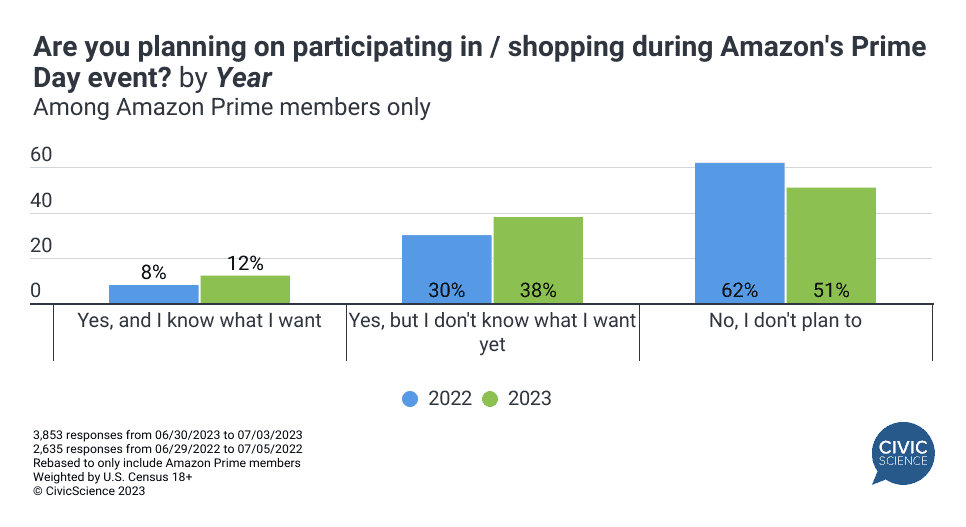
People are apparently more concerned about income inequality than racial inequality. In our 3 Things to Know this week, we looked at the state of U.S. public sentiment around the wealth gap in our country. The numbers have held fairly steady for the past two years, with two-thirds of Americans saying they’re at least somewhat concerned about the problem. We also asked about affirmative action, finding that 41% of adults support it, versus 32% who don’t. Meanwhile, 53% of people say they do NOT believe colleges should take race into consideration during admissions (perhaps because it cuts both ways), versus 23% who say they should. Anyway, non-sequitur, we also asked about pedestrian and bike safety.
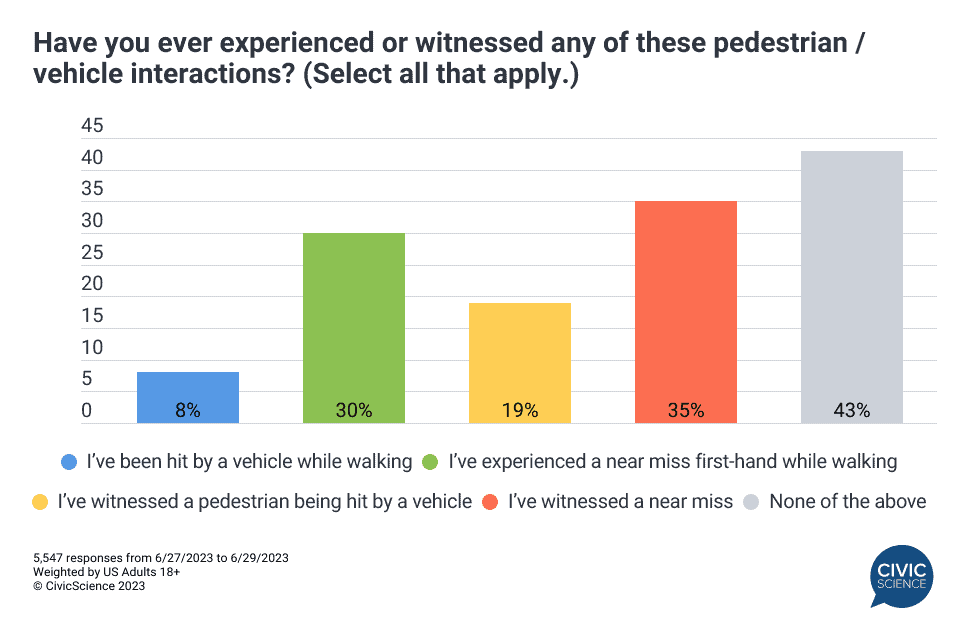
Compounded by SCOTUS’s nullification of the student loan forgiveness program, the return of student debt payments could impact a lot of life events for younger adults. A whopping 46% of student loan debtors say the repeal of President Biden’s loan forgiveness initiative and the end of the debt payment pause will cause them to rethink one or more major financial decisions. Savings and other debt will be impacted the most, followed by car and home purchases. Even weddings and having babies could be delayed. One way or another, something has to give.
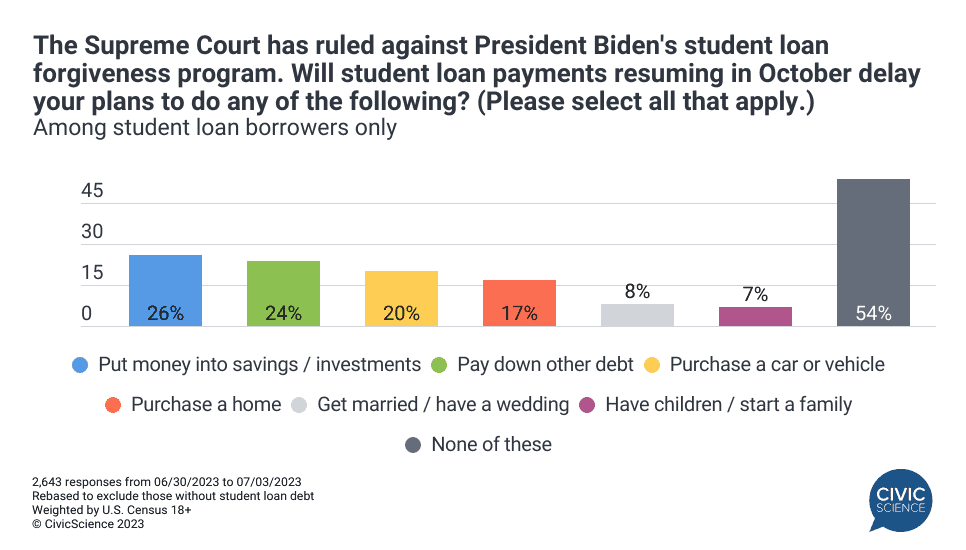
Watching Mark Zuckerberg go after Elon Musk should be entertaining. If you’ve followed the news of Meta/Facebook/Instagram’s new Twitter alternative, Threads, you know that the platform saw a staggering 30 million people sign up in its first 24 hours of existence. We began polling people about Threads right away and the numbers are impressive. Twenty percent of U.S. adults say they are at least somewhat likely to use the service, including 57% of current daily Twitter users (for context, about 23% of Americans use Twitter). Naturally, the likely Threads users skew younger. We’ll keep a close eye on this one as it unfolds.
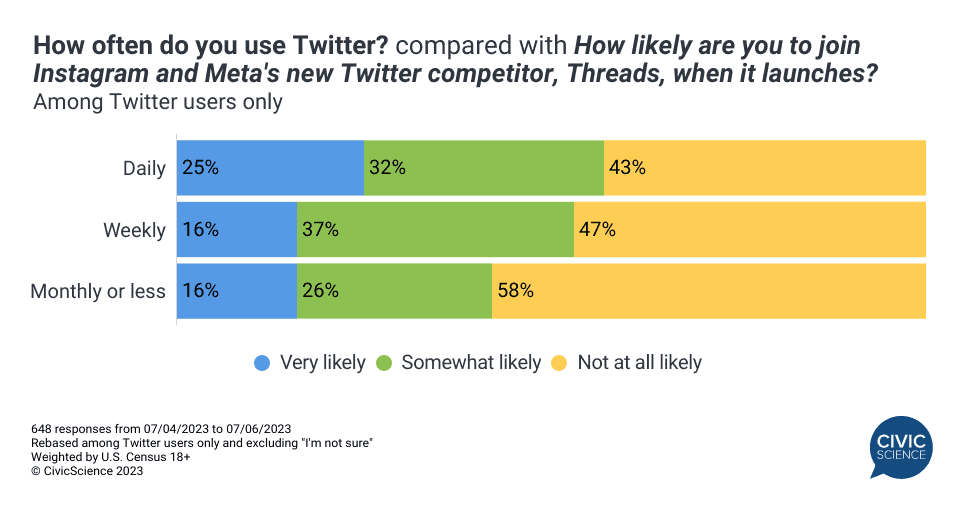
More awesomeness from the InsightStore™:
- Trust in cryptocurrency is in the toilet and support for government regulation is high;
- McDonald’s Grimace Shake is getting a huge boost from TikTok;
- The coming wave of new car buyers are super tech-savvy, close followers of beauty trends, and more fascinating insights;
- Three notable insights about the state of advertising and influence.
The most popular questions this week:
- How would you rank the ‘Mission: Impossible’ franchise among all action movies?
- How likely, if at all, is it that you would help a stranger in need?
- Do you generally think it’s a good or bad idea for people to bring dogs with them to breweries?
- Do you think some foods are just too hot to eat in the summer?
- How much do you agree or disagree with the idea that America’s exceptionalism is harmful?
Answer Key: It’s up there. I love it; Very; If it’s dog-friendly, sure; No way, the hotter the better; Somewhat disagree.
Hoping you’re well.
JD
Not on the list to receive this weekly email? Sign up here. If you are new to this list, check out our Top Ten to get caught up.








